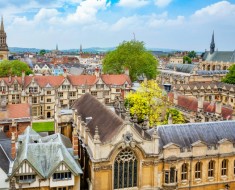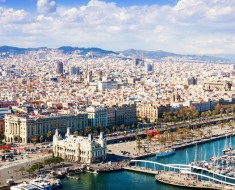Newcastle has a rich history. It was founded by the Roman Emperor Hadrian in the 2nd century and the great wall named after him – spanning the breadth of England – can still be traced in some parts of the city. After the Roman withdrawal from Britain, Newcastle became part of the powerful Anglo-Saxon kingdom of Northumbria, and after a series of conflicts with the Vikings and the devastation north of the River Tyne inflicted after the 1080 rebellion against the Normans, the city was virtually destroyed, but William the Conquerer’s son, Robert Curthose, built a wooden castle there in 1080 and the town was given its new name : Novum Castellum, or New Castle.
The city became England’s most northern fortress and during the fourteenth century was successfully defended against the Scots three times. Newcastle’s development as a major city, was made possible because of the River Tyne and its central role in the export of coal In the 19th century, shipbuilding and heavy engineering were central to the city’s growing prosperity, and the city was a powerhouse of the Industrial Revolution.
Innovation in Newcastle and surrounding areas included, Stephenson’s Rocket, Lord Armstrong’s artillery, Joseph Swan’s electric light bulbs, and Charles Parsons’ invention of the steam turbine, which led to the revolution of marine propulsion and the production of cheap electricity.
The city has an extensive neoclassical centre, largely developed in the 1830s by Richard Grainger and John Dobson, and the recently restored. Grey Street (named after Earl Grey, Prime Minister 1830-1834 and the inventor of the famous blend of tea) curves down from Grey’s Monument towards the valley of the River Tyne, and was voted England’s finest street in 2005 in a survey of BBC Radio 4. The Tyne Gorge between Newcastle on the north bank and the borough of Gateshead on the south bank, is famous for a series of dramatic bridges.
Large-scale regeneration has replaced former shipping premises with developments including the BALTIC Centre for Contemporary Art and the Sage Gateshead Music centre, both of which we have visited.
Newcastle is a lovely city and has an atmosphere all of its own that marks it out amongst our other notable northern cities. A city is people as well as place, and Newcastle is known for the warmth and friendliness of the ‘Geordies’ for whom it is home – and for its football team with its one-time manager, Kevin Keegan returning to energise the team and give hope to its many fans. And if you visit Newcastle from the south by road or rail, you will see Anthony Gormley’s stunning sculpture ‘The Angel of the North’, in itself an invitation to a unique part of Britain.
B.R.




